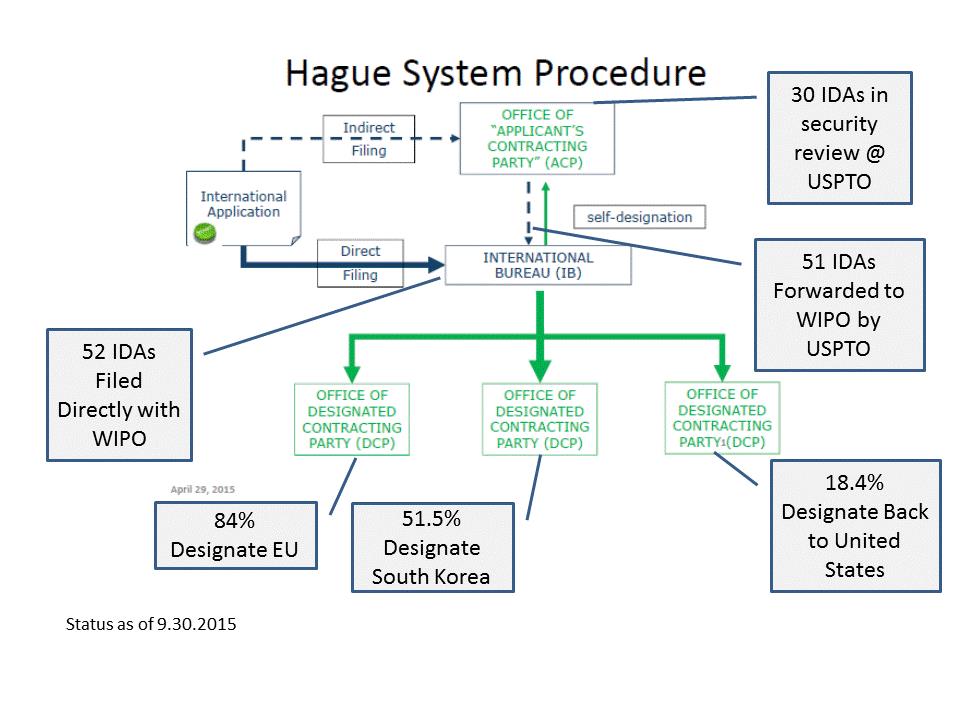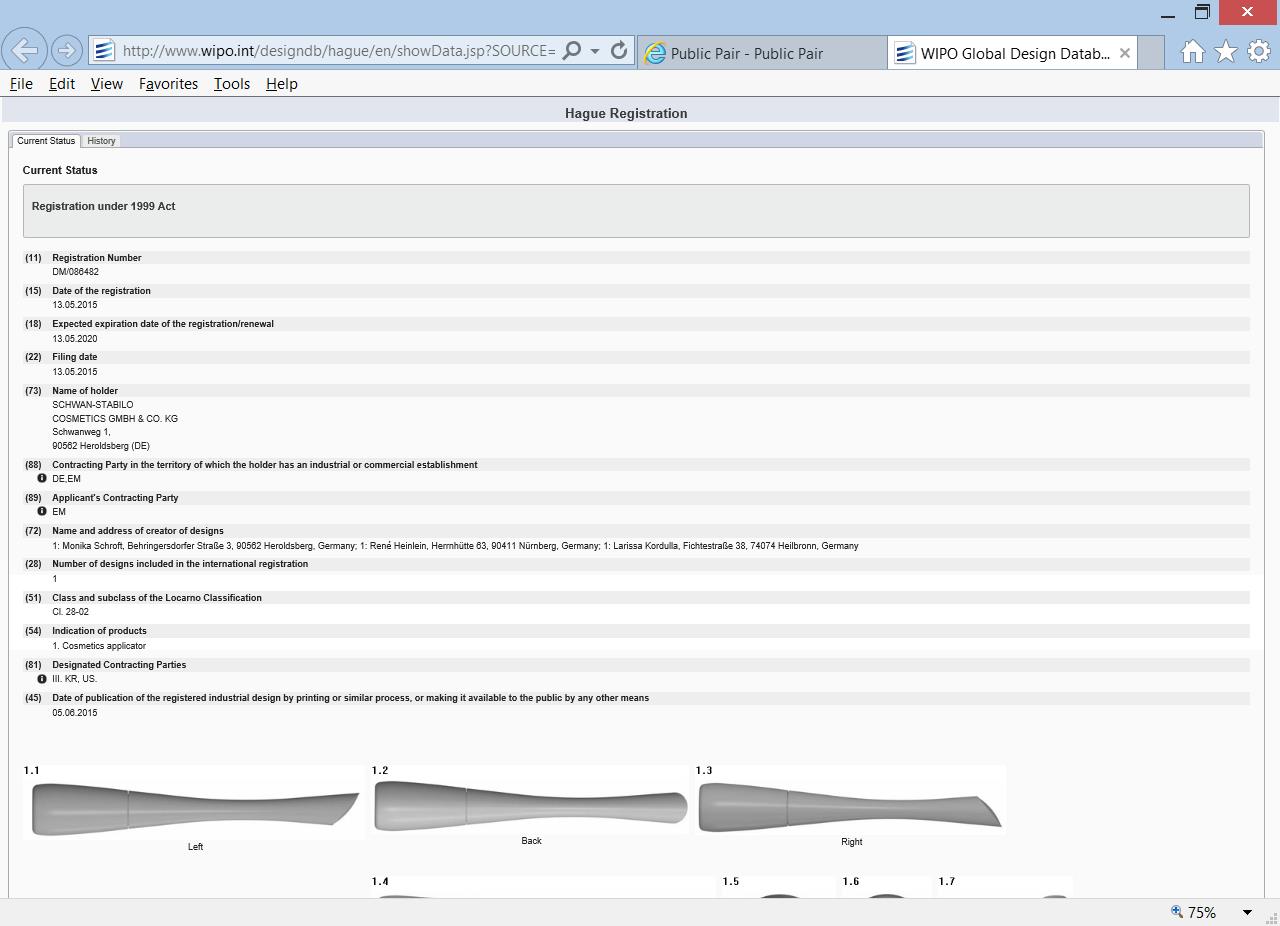
Design Patents
Understanding the Hague System—Six Months Later: How’s It Going So Far?
Back in June, we wrote about the United States joining the Hague Agreement Concerning the International Registration of Industrial Designs. Since May 13, 2015, it has been possible for U.S. applicants to file an International Design Application (IDA), either directly with the World Intellectual Property Organization (WIPO) or through the U.S. Patent and Trademark Office (USPTO), as an office of indirect filing. It has also been possible for applicants from other Hague member countries and jurisdictions to file IDAs and designate the United States as a country to receive the IDA. We will now consider the early results of both of these types of transactions.
Hague Applications Filed by U.S. Applicants
From May 2015 through September 2015, WIPO reports that 103 IDA applications from the United States have been filed with WIPO. After a slow start in May, June through September averaged 25 applications per month.

- Which Office Did U.S. Applicants Use to File? WIPO reports that about half of the applications were filed directly with WIPO and the rest were filed with the USPTO as an office of indirect filing. The USPTO has been taking about 50 days to forward IDAs to WIPO, but WIPO expects this turnaround time to be shorter as the USPTO reviews more IDAs.1 Also, another 30 applications had been filed at the USPTO, but not yet forwarded to WIPO, because those applications are still undergoing the mandatory security review.
- How Do the U.S. Numbers Compare? By comparison during this period, European Union applicants filed more than 540 IDAs, the most of any Hague jurisdiction.
- How Many IDAs from U.S. Applicants Claim Priority to Another Application? WIPO reports that 82.5% of the 103 applications from the U.S. claim priority to a U.S. design application. Thus, it seems that most U.S. applicants file first in the United States and then file a Hague IDA application as one part of their foreign filing strategy.
- What Other Countries Do U.S. Applicants Designate? Of these same 103 applications, the applications on average designated ten other contracting parties, including the European Union (84%), South Korea (51.5%), Japan (48.5%), Switzerland (29%), and the United States (18.4%). Presumably, the applications that designate back to the United States do not claim priority to an earlier filed U.S. application.
- What Does WIPO Say About These Applications? The WIPO representative at the 2015 Annual American Intellectual Property Law Association (AIPLA) Meeting offered some general advice to filers.
First, WIPO reminds filers not to number the figures, because the Hague system does this automatically. And filers are also reminded to include only one figure per page.
Second, WIPO says to rely on the data fields provided in the application, not additional documents. For instance, rather than submitting a separate specification, filers should use the description field in the application to describe their figures. Adding additional pages will likely create delay because the WIPO examiner might be confused about any differences between the description field and the additional specification.
Finally, WIPO reminds filers that filing directly with WIPO will give filers access to the WIPO interface, which includes many error-checking functions. Filing directly with WIPO (provided that U.S. filers already have a U.S. foreign filing license) also eliminates certain fees and allows filers to use the WIPO Portfolio Manager function to manage all Hague applications from a single interface.
Hague Applications Designating the United States
From May 2015 through September 2015, according to WIPO, 536 IDAs have designated the United States, meaning that the applicant wished to have the IDA examined by the USPTO in hopes of getting a U.S. design patent. But as of early November, only 236 applications have made it to the USPTO and been posted on Public PAIR.
- What Is the Status of These Applications? One application, Application No. 35/500,001, has been allowed (more on that below). The remaining 235 applications are visible on Public PAIR, because the applications have been published by WIPO and loaded into the PAIR system.
- Filing receipts were sent by the USPTO in another ten applications in early July and another four in early October. As part of the filing receipt process, it appears that the USPTO has undergone verification of small and micro entity status for these applications. Some substantive examination appears to have taken place for one of these applications. But the majority of applications appear to still be in “preexamination.”
- What Does the USPTO Say About This Progress? The USPTO representative at the 2015 Annual AIPLA Meeting stated that the applications are usually available on Public PAIR within a week of publication by WIPO. The USPTO has processed two test cases (perhaps Application Nos. 35/500,001 and 35/500,014) and will process additional applications soon. This appears to be consistent with the information available on Public PAIR, as noted above. The USPTO’s current plan is to distribute the IDAs to a group of ten examiners.
- What Is Available on Public PAIR? The tabs for a Hague application are similar to a standard design application. The Image File Wrapper includes the application broken down as a typical application would be, with drawings, claims, specification, oath or declaration, etc. Notably, “Published Documents” has a link to the Hague Application “publication,” which is electronic. The “publication” itself is a webpage titled “Hague Registration” and includes the originally filed figures. Below is an example for Application No. 35/500,001, also known as Dm/086482:

Another interesting feature is that the “Address & Attorney/Agent” has the correspondence address for the applicant, but no Attorney/Agent data are listed. This is important because, if the USPTO issues any sort of substantive office action (such as requiring a restriction, or objecting or rejecting the pending claim), then the applicant will need to retain a representative with a USPTO Registration Number in order to respond to the pending action. In the case of a restriction requirement, with only a two-month period for response, applicants should probably consider in advance whom they plan to retain, if necessary.
- What About the Application that Was Allowed? On October 23, 2015, the USPTO issued a Notice of Allowance in Application No. 35/500,001. This appears to be the first Hague IDA to receive a notice of allowance. The application is titled “Cosmetics applicator” and includes a single embodiment with seven figures (currently numbered 1.1 to 1.7). The figures are computer-generated images of the claimed design. The applicant has only provided single-word descriptions for each figure (e.g., “1.1 : Left,” “1.2 : Back,” “1.7 : Perspective”). The application also includes the traditional claim, “The ornamental design for a cosmetics applicator as shown and described.” It will be interesting to see if, in formatting this application for printing as a patent, the USPTO changes the figure numbers to single digits (e.g., “1.1” to “1”) and if the USPTO adds any further language to the description, to conform with current practice for U.S. design patent applications.
The application was allowed as a first action. Thus, it appears that, in this case, if the applicant pays the issue fee in a timely manner, the applicant will receive a U.S. design patent without retaining U.S. local counsel. This is an important cost savings goal of implementing the Hague system.
- Any Predictions on the Other Hague Applications? A small sampling of applications in the pipeline reveal that the road to a Notice of Allowance might be more challenging for some applications than for others. For instance:
- Application No. 35/500,004, directed to a design for a “Flowerpot,” contains five figures: the first is a photograph and the remaining four are line drawings. Under M.P.E.P. § 1503.02, photographs and line drawings are not permitted to be combined as formal drawings in a single application.
- Application No. 35/500,100, directed to a “Base for a safety child seat,” contains no figure descriptions for its seven figures. Instead, the entire description is “Base for a child seat to be mounted on the rear seat of a car.” While M.P.E.P. § 1503.01(II) does not require that descriptions be written in any particular format, if the descriptions “do not describe the views of the drawing clearly and accurately, the examiner should object to the unclear and/or inaccurate descriptions and suggestion language which is more clearly descriptive of the views.” Thus, it seems that some sort of description is necessary under current USPTO rules.
- Application No. 35/500,235, directed to a “Graphical user interface [computer screen layout]”, likewise contains no description beyond the title. First, the title does not appear to comply with USPTO procedures for describing this type of article of manufacture. See M.P.E.P. § 1504.01(a) (requiring titles such as “computer screen with icon”). Moreover, the single figure does not appear to depict “a computer-generated icon shown on a computer screen” as required by M.P.E.P. § 1504.01(a) and Ex parte Strijland, 26 U.S.P.Q.2d 1259 (B.P.A.I. 1992).
Growing Pains for Applicants on Both Sides
While it is definitely still early, it seems that many IDAs in the pipeline will test the integration of Hague applications into the USPTO examination system. Undoubtedly, there will be office actions, and applicants will need to learn how to respond to those office actions on the road to allowance of their claimed design. Likewise, U.S. applicants will need to learn the ways of the Hague system as they navigate the road to design rights in other Hague-member countries. It will be exciting to see everyone get more comfortable with the Hague system as it becomes a more viable option for all members seeking rights outside their homeland.
1 As reported by a WIPO representative at the Annual AIPLA Meeting in Washington, DC, at the end of October 2015.